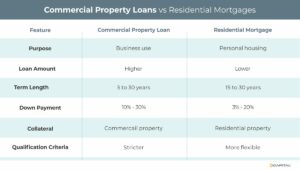
Commercial Property Loans: A Comprehensive Guide to Financing Your Business Real Estate
Content
- What Is a Commercial Property Loan?
- Key Features of Commercial Property Loans:
- How Do Commercial Property Loans Work?
- Types of Commercial Property Loans
- Benefits of Commercial Property Loans
- Challenges of Commercial Property Loans
- Eligibility Requirements for Commercial Property Loans
- Tips for Securing a Commercial Property Loan
- Real-World Example: Commercial Property Loan in Action
- Conclusion
- Key Takeaways
A commercial property loan is an essential business financing tool to acquire, expand, or refinance commercial properties. It provides the necessary funds for companies to purchase and develop high-value properties, such as office space, retail storefronts, warehouses, or other commercial real estate assets.
In this blog, we’ll explore commercial property loans, how they work, the benefits they offer, and what businesses need to know to secure the right loan for their needs.
What Is a Commercial Property Loan?
A commercial property loan is a type of mortgage specifically designed for financing real estate used for business purposes. These loans are tailored for purchasing or refinancing properties like offices, retail centers, industrial facilities, or multi-family residential complexes.
Key Features of Commercial Property Loans:
- Secured by Property: The purchased property acts as collateral for the loan.
- Larger Loan Amounts: Designed to support high-value property purchases.
- Flexible Terms: Loan terms typically range from 5-year to 30-year amortization periods.
- Interest Options: Fixed or variable interest rates depending on the lender and market conditions.
How Do Commercial Property Loans Work?
- Loan Application: Businesses apply for a loan, providing financial documentation and details about the property.
- Assessment: Lenders evaluate the borrower’s creditworthiness, business income, and the property’s value and income potential.
- Approval: The loan is approved based on the borrower’s financial stability and the property’s projected ability to generate revenue.
- Disbursement: The lender provides the funds, typically covering a percentage (e.g., 70%-90%) of the property’s purchase price.
- Repayment: Borrowers repay the loan through regular installments over the agreed term.
Types of Commercial Property Loans
- Traditional Commercial Mortgages
- Fixed-term loans for purchasing or refinancing commercial real estate.
- SBA Loans (Small Business Administration)
- Loans backed by the SBA, such as the SBA 504 Loan or SBA 7(a) Loan, offer favorable terms for small businesses.
- Bridge Loans
- Short-term financing to cover immediate needs until permanent financing is secured.
- Construction Loans
- For building new commercial properties or significant renovations.
- Hard Money Loans
- Short-term loans based on property value, often used for quick acquisitions.
Benefits of Commercial Property Loans
- Property Ownership
- Allows businesses to own their premises rather than renting, building equity over time.
- Stable Costs
- Fixed-rate loans provide predictable monthly payments, protecting against rising rental costs.
- Revenue Generation
- Commercial properties can generate rental income if leased to other businesses or tenants.
- Tax Advantages
- Interest payments and property depreciation may be tax-deductible, reducing the overall cost.
- Business Growth
- Owning commercial property can enhance credibility, provide space for expansion, and improve asset value.
Challenges of Commercial Property Loans
- Higher Down Payments
- Commercial property loans typically require larger down payments, often ranging from 10%-30% of the property’s value.
- Stricter Qualification Criteria
- Lenders require strong credit scores, financial statements, and sometimes collateral beyond the property.
- Variable Costs
- Loans with adjustable interest rates can lead to fluctuating monthly payments.
- Maintenance and Repairs
- Property ownership includes ongoing costs for upkeep, insurance, and property taxes.
- Long Approval Process
- Commercial property loans involve more extensive evaluation and longer approval timelines than residential loans,
Eligibility Requirements for Commercial Property Loans
- Business Financials
- Strong financial statements, including balance sheets, income statements, and cash flow projections.
- Creditworthiness
- Good personal and business credit scores to demonstrate reliability.
- Down Payment
- Ability to provide the required down payment (often 10%-30%).
- Property Value and Purpose
- The property’s value and intended use must align with the loan terms.
- Debt-Service Coverage Ratio (DSCR)
- Lenders often require a DSCR of 1.25 or higher, indicating the property generates sufficient income to cover debt payments.
Tips for Securing a Commercial Property Loan
- Improve Your Credit
- Both personal and business credit scores impact loan eligibility. Ensure your credit is in good standing.
- Prepare Financial Documentation
- Provide accurate and detailed financial statements to demonstrate your business’s ability to repay the loan.
- Save for a Down Payment
- Accumulate sufficient funds for the required down payment and closing costs.
- Research Loan Options
- Compare lenders, interest rates, and terms to find the best fit for your needs.
- Consult Experts
- Work with commercial real estate brokers, financial advisors, or loan officers to navigate the process effectively.
Real-World Example: Commercial Property Loan in Action
Scenario: A growing restaurant chain needs $1 million to purchase a property for its newest location.
Solution: The business secures an SBA 504 Loan, covering 90% of the purchase price with a low interest rate and a 25-year term.
Outcome: The restaurant opens its new location, reduces monthly costs compared to leasing, and builds equity in the property over time.
Conclusion
A commercial property loan is a powerful tool for businesses investing in real estate, expanding operations, or reducing overhead costs. While the process may seem complex, careful planning, research, and preparation can make securing a loan more manageable.
By owning commercial property, businesses gain stability, potential tax benefits, and the opportunity to grow their assets. If you’re considering a commercial property loan, consult with trusted lenders and financial advisors to ensure the loan aligns with your business goals. With the right financing, your company can thrive in the commercial real estate space with terms and conditions tailored to meet your business needs.
Contact us – our experienced team of financial specialists is available to consult, advise, and administer effective financing solutions to meet your business goals.
Key Takeaways
- A commercial property loan provides the necessary funds for companies to acquire and develop high-value properties.
- These loans are tailored for purchasing or refinancing properties like offices, retail centers, industrial facilities, or multi-family residential complexes.
- Careful planning, research, and preparation can make securing a loan more manageable.
ABOUT eCapital
At eCapital, we accelerate business growth by delivering fast, flexible access to capital through cutting-edge technology and deep industry insight.
Across North America and the U.K., we’ve redefined how small and medium-sized businesses access funding—eliminating friction, speeding approvals, and empowering clients with access to the capital they need to move forward. With the capacity to fund facilities from $5 million to $250 million, we support a wide range of business needs at every stage.
With a powerful blend of innovation, scalability, and personalized service, we’re not just a funding provider, we’re a strategic partner built for what’s next.



